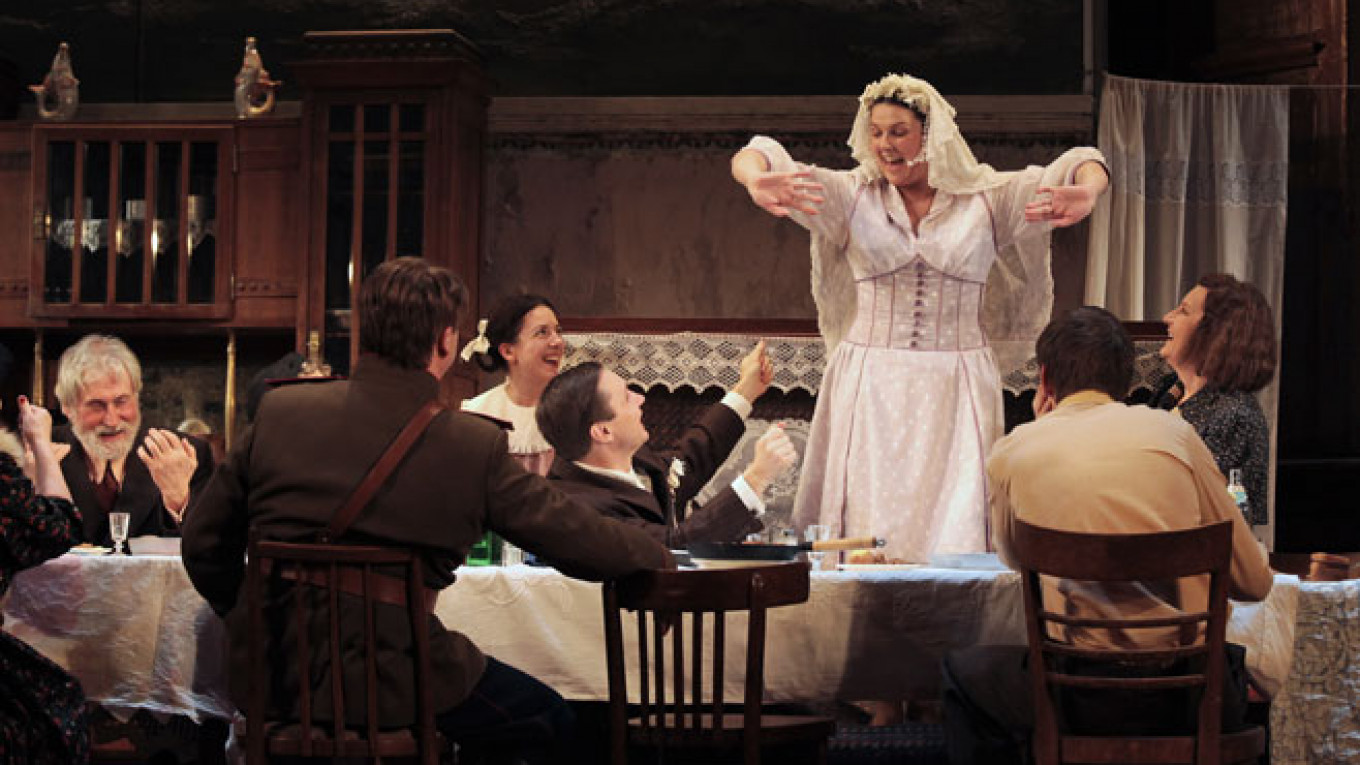There is a lot to Nikita Kobelev's production of Fridrikh Gorenshtein's "Berdichev." It takes nearly four hours to perform. It covers a span of 30 years and involves 23 characters of family, friends, acquaintances and enemies.
The one thing I wish there was even more of is Tatyana Orlova who plays Rachel Kaptsan, the central figure in this sprawling tale. She is spectacularly grumpy, quick thinking, acid-tongued and easily offended. She is always prepared to attack, is never at a loss for words, is always ready to teach everyone whatever they don't know and, somewhere down deep inside, is as warm as an old woolen sock.
Orlova plays one of those quintessential cockeyed characters that only the closest relatives and a theater packed full of spectators could love.
Orlova's Rachel reigns over a rare surviving family of Jews in the western Soviet city of Berdichev following World War II. Like her laid-back brother Zummer (Igor Marychev) and her docile sister Zlota (Tatyana Augshkap), she found a way to maneuver through the dangers that the society around her harbored. To anyone who dares challenge her in any way big or small, she barks that she has been a member of the Communist Party since 1926.
She uses that information to beat back her neighbor Bronfenmacher (Dmitry Prokofiev) when he suggests putting a corridor from his apartment through her living room. She batters her nephew Vilya (Alexander Pal) with it when he gets too insolent. She employs it as a matter of status at the big wedding of her daughter Ruza (Zoya Kaidanovskaya).
Yet Rachel's connection to the Communist Party is just one of many bludgeon-like defensive instruments she uses if the need arises. This is a woman for whom endurance is everything. Her husband is dead, killed in the war; the community she was part of has been decimated; her brother did time in prison, presumably for so-called financial crimes — she is in no position to ever let down her guard.
Gorenshtein follows Rachel and the constellation of people around her through times marked by huge political, geopolitical and social changes — war, the death and debunking of Stalin, the Hungarian and Czech uprisings. The country changes, the world changes, but Rachel and her family hang on with tenacity and humor.
This is an old-fashioned story told in an old-fashioned way. It is a time-honored and time-worn family saga. Over the course of the performance we watch new people enter the picture and old ones leave it.
Rachel's aging, and then aged, brother, who once was a member of the tsar's army, looks upon the entire era he has lived through with a bit of humor and a shrug of the shoulders. The harder the memory, the softer the smile with which he remembers it. He dies, we learn, in a shopping center. Imagine that.
Perhaps the most important character in this play aside from Rachel is Vilya, the nephew who is brought up by his aunts. He is caustic, rebellious and rude in a way that Rachel never quite is.
What a surprise, then, when Vilya returns home decades later a well-mannered, thoughtful and highly accomplished adult. There is something that is both unexpected and natural in that quietly life-affirming development.
Designer Mikhail Kramenko mixes the micro and macro stories by creating a detailed apartment interior that evolves with new or reshuffled furniture as the years go by. A television replaces the family radio and a grand-nephew, in a moment of modern anger, smashes the bust of Lenin that Rachel has possessed for decades.
A water tower that was once a landmark of the town is visible through a cutaway in the back wall, but it, too, comes apart bit by bit as the years pass.
"Berdichev," pronounced with the stress on the "i," runs so long and attempts to keep track of so many people that it cannot possibly hold our interest the whole way through. Many of the details of plot and character lose their value as they continue to pile up one on the other.
There were moments during the performance when I definitely felt that less would have been more. Not one, however, involved Tatyana Orlova, who turned in one of the finest acting jobs I have seen this season.
"Berdichev" plays March 16 and 29, April 6, 18 and 25 at 7 p.m. at the Mayakovsky Theater, located at 19/13 Bolshaya Nikitskaya Ulitsa. Metro Arbatskaya, Pushkinskaya. Tel. 495-690-4658. mayakovsky.ru.
Contact the author at [email protected]
A Message from The Moscow Times:
Dear readers,
We are facing unprecedented challenges. Russia's Prosecutor General's Office has designated The Moscow Times as an "undesirable" organization, criminalizing our work and putting our staff at risk of prosecution. This follows our earlier unjust labeling as a "foreign agent."
These actions are direct attempts to silence independent journalism in Russia. The authorities claim our work "discredits the decisions of the Russian leadership." We see things differently: we strive to provide accurate, unbiased reporting on Russia.
We, the journalists of The Moscow Times, refuse to be silenced. But to continue our work, we need your help.
Your support, no matter how small, makes a world of difference. If you can, please support us monthly starting from just $2. It's quick to set up, and every contribution makes a significant impact.
By supporting The Moscow Times, you're defending open, independent journalism in the face of repression. Thank you for standing with us.
Remind me later.







